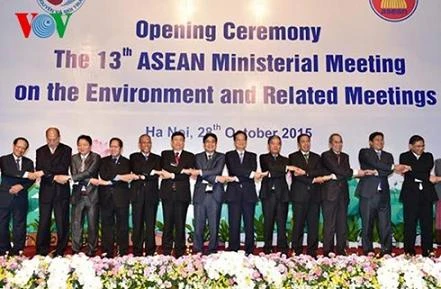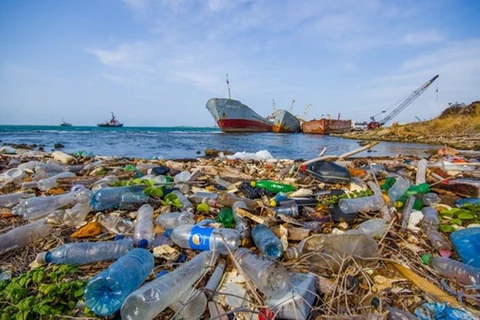Phnom Penh (VNA) – The 15th ASEAN Ministerial Meeting on the Environment (AMME 15) and related meetings concluded in Siem Reap, Cambodia, on October 9 and released a joint statement.
In the statement, the ministers acknowledged the achievements and progress of regional environmental protection and cooperation on a number of environmental issues, in particular prioritised actions and initiatives taken on environmental sustainability to further promote environmental cooperation in the region.
They recognised that key cross-cutting and emerging environmental issues such as climate change and marine debris pollution remain a challenge which requires regional collective actions.
The ministers also noted the continuing dialogue between ASEAN and partners in the key cross-cutting and emerging environmental issues such as climate change, environmentally sustainable cities, and circular economy in the ASEAN-EU High-Level Dialogue on Environment and Climate Change held on July 8, 2019 in Bangkok, Thailand.
They looked forward to a successful outcome of the 25th session of the Conference of the Parties (COP25) to the United Nations Framework Convention on Climate Change (UNFCCC), which will take place on December 2-13, 2019 in Santiago, Chile, including the convening of an ASEAN event under the Indonesia and Thailand pavilions at the sideline of the COP25.
They endorsed the ASEAN Joint Statement on Climate Change to COP25 to United Nations Framework Convention on Climate Change (UNFCCC) for the consideration by the Leaders.
They recognised the high and rapidly increasing levels of marine debris, and reaffirmed their commitment for the implementation of the Bangkok Declaration on Combating Marine Debris in ASEAN Region and the ASEAN Framework of Action on Marine Debris.
The ministers noted the progress of implementation of marine-debris related projects and initiatives, including among others the ASEAN Plus Three Project on Strengthening Capacity for Marine Debris Reduction in ASEAN region through Formulation of National Action Plan for AMS and Integrated Land to Sea Policy Approach (Phase I) supported by Japan, the ASEAN-PROBLUE Activities on Marine Debris supported by the World Bank, the ASEAN-Norwegian Cooperation Project on Local Capacity Building for Reducing Plastic Pollution in the ASEAN Region (ASEANO), and the ASEAN-EU Partnership on Circular Economy.
They also noted that the Third ASEAN Conference on Biodiversity (ACB2020) will be held in Putrajaya, Malaysia, on March 16-19, 2020.
The ministers congratulated the four ASEAN Heritage Parks approved last year in 2018, namely Bantimurung Bulusaraung National Park (Indonesia), Agusan Marsh Wildlife Sanctuary (Philippines), Bidoup Nui-Ba National Park (Vietnam), and Vu Quang National Park (Vietnam) for their designation as the 41st, 42nd, and 43rd and 44th ASEAN Heritage Parks respectively in 2018.
They expressed concern over the severity and geographical spread of the recent smoke haze affecting various ASEAN countries in the northern and southern ASEAN. They also expressed sympathy to the millions of people affected by the haze. The ministers noted and appreciated the efforts undertaken by the ASEAN countries, and the offers of assistance by countries to address the forest fires and the associated smoke haze.
They noted ASMC’s efforts to deliver objective and reliable services to the ASEAN region in weather and climate prediction, and in monitoring, assessment and provision of early warning for trans-boundary haze.
They reviewed the implementation of the ASEAN Agreement on Trans-boundary Haze Pollution (AATHP) and reaffirmed their commitment through concerted national efforts and regional cooperation to effectively implement the AATHP and the Roadmap on ASEAN Cooperation towards Trans-boundary Haze Pollution Control with Means of Implementation to achieve a Haze-Free ASEAN by 2020.
The progress towards the finalisation of the Establishment Agreement and Host Country Agreement of the ASEAN Coordinating Centre for Trans-boundary Haze Pollution Control (ACC THPC) in Indonesia and the urgency to further intensify efforts to bring the negotiations to conclusion were also reviewed.
The ministers met their counterparts from Japan and Plus Three countries (China, Japan, and the Republic of Korea) at the ASEAN-Japan Ministerial Dialogue on Environmental Cooperation and the 16th ASEAN Plus Three Environment Ministers Meeting respectively on October 9, 2019 to review current activities and discuss future strategic cooperation in such areas of biodiversity, climate change, environmental education, environmental science and technology, environmentally sustainable cities, and marine plastic debris, amongst others./.
























